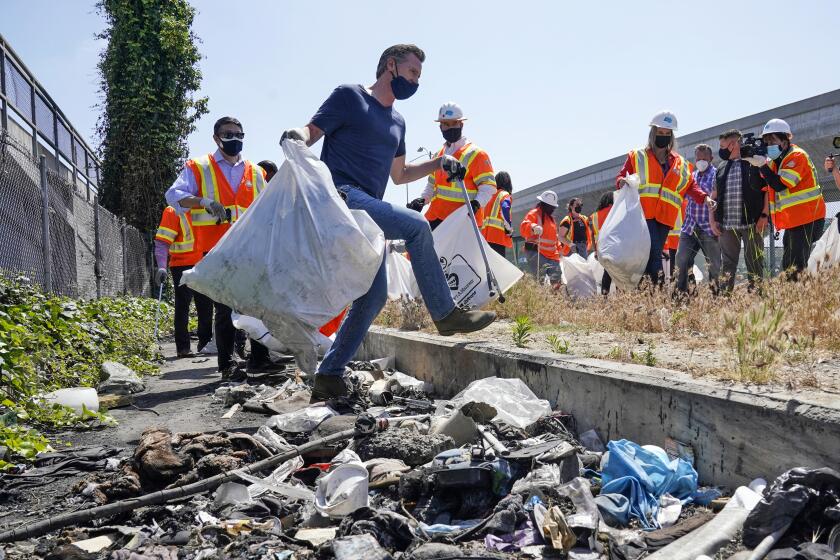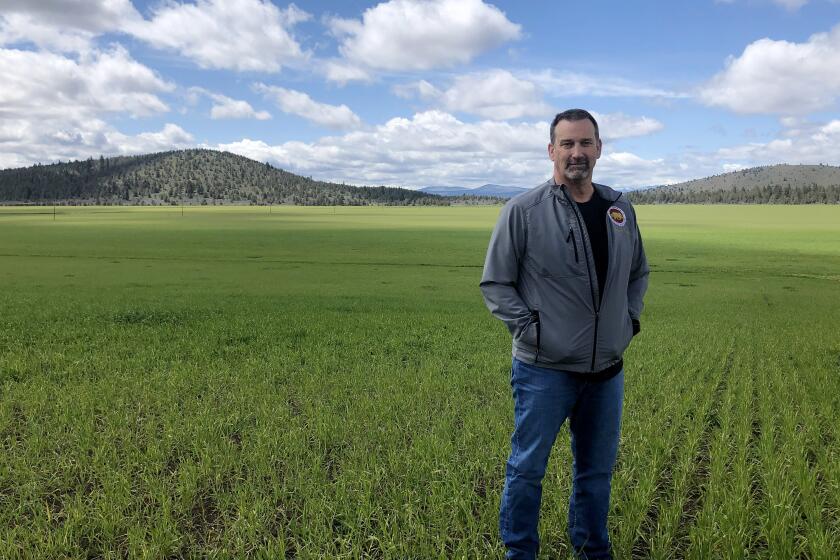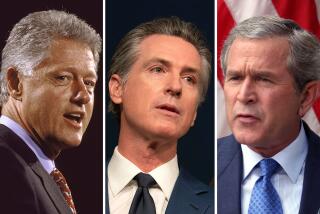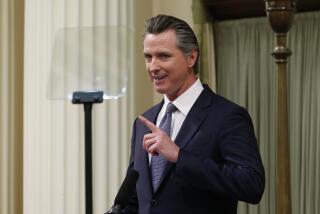Their long-shot California dream: Beating Gov. Gavin Newsom
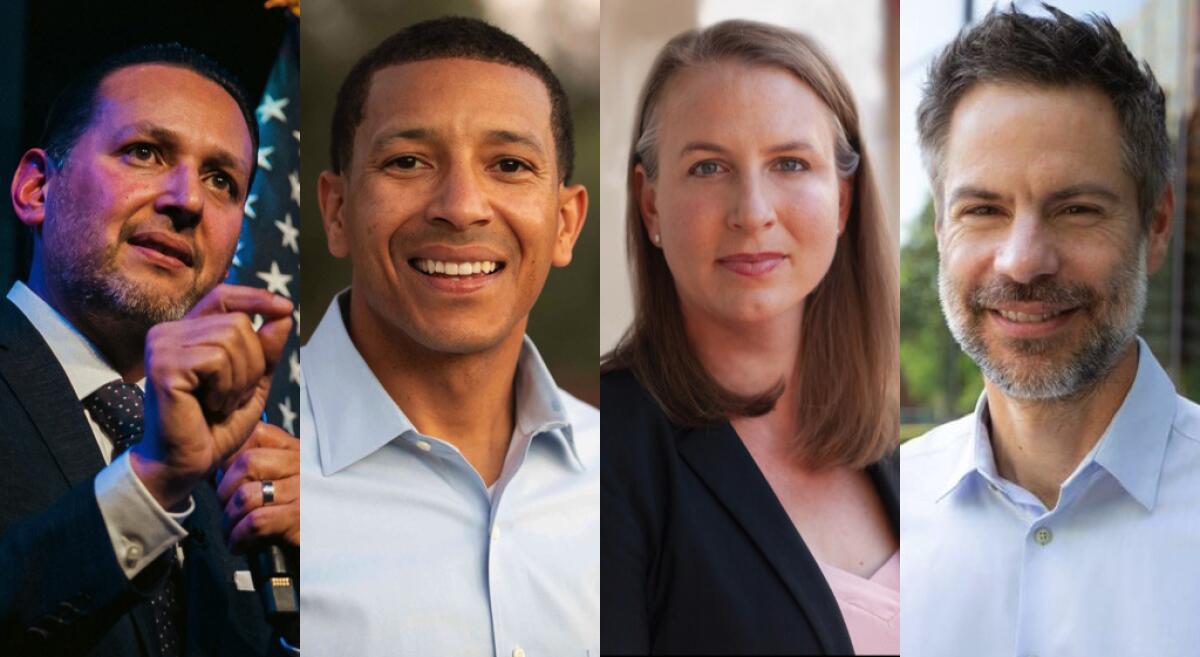
With no widely known, well-funded challenger to Gov. Gavin Newsom’s bid for reelection, a motley assortment of deep-thinkers, also-rans and fed-up political neophytes each holds a modicum of hope that, just maybe, they will shock California by winning enough votes in the June 7 primary to face off against the governor in the general election.
The 25 challengers include a seasoned Northern California lawmaker, Republican state Sen. Brian Dahle and Green Party candidate and former Los Angeles poet laureate Luis Javier Rodriguez.
Only a handful have raised more than $250,000 for their campaigns, with Dahle leading the pack by raking in $1.4 million. That’s a pittance in a state the size of California, where the price tag of a successful gubernatorial campaign typically runs in the tens of millions of dollars.
For some, this is the second go-around against Newsom. Both Orange County advertising executive Anthony Trimino — who hired a skywriter to spell out “Unmask Our Kids” over the Super Bowl at SoFi Stadium in February — and business consultant Jenny Rae Le Roux of Redding ran for governor during the failed Republican-led recall against Newsom in September. Michael Shellenberger, a Bay Area homelessness and environmental advocate, challenged Newsom in 2018.
But none seems likely to pose a significant challenge to Newsom, who handily defeated the recall effort in September and has more than $23 million in his reelection campaign account.
Jim Brulte, former chairman of the California Republican Party, said that in the fight to finish in the top two in the primary and challenge Newsom in November, the competition between the challengers “is Brian Dahle’s to lose.” Along with his financial advantage, Dahle already represents close to 1 million Californians in the Legislature and has a two-decades-long track record of winning elections in Northern California.
Still, a few others in the race are capable of making a dent, Brulte said. The most active among the list of long-shot candidates is an eclectic group of candidates who have each raised six-figure sums for their campaigns. None has ever been elected to public office and they come from differing political camps, bound together only by their loathing of the Democrat currently in office.
Brulte said Shellenberger, who is running as an independent, “no party preference” candidate, must overcome the disadvantage of having no political party in his corner. Even when Shellenberger did have a party affiliation as a Democratic candidate in 2018, he drew only 1% of the vote in the gubernatorial primary.
Having a Republican or Democratic label next to a candidate’s name on the ballot gives voters a cue about their political beliefs. “Party affiliation is the single biggest determinant of who wins in the primaries and general election,” Brulte said.
Shellenberger rejects the analysis. He said California voters are primed to embrace an alternative to the entrenched partisan on the ballot in every election.
“I think this is our moment,” he said. “Everything Gavin Newsom touches he ruins. He’s not only made homelessness significantly worse, he’s also worsened forest fires and he’s exacerbated the consequences of the drought by failing to take the measures that he needs to take. He’s also worsened student performance. I mean, it’s hard to imagine a governor with a worse governing record than Gavin Newsom.”
Shellenberger, 50, worked with leftist Sandinistas in Nicaragua in the late 1980s during what he calls his “radical youth.” Today, he is a vocal critic of California’s big-city progressives, with Newsom topping his list. The author and activist has called the nation’s environmental movement out of touch and is a strong advocate of expanding the nation’s nuclear energy capabilities.
Two of Gov. Gavin Newsom’s most vocal challengers in this year’s governor’s race are hoping to tap into voter anger over homelessness, crime and other quality-of-life issues.
The son of Colorado public school teachers, he accused Newsom of keeping public schools closed for longer than necessary amid the COVID-19 outbreak, noting the governor’s children had in-classroom instruction at a Sacramento private school.
Shellenberger blames Democrats for the state’s rise in homelessness and various crimes. He believes temporary shelter should be made available to everyone, but those seeking permanent housing should be required to seek treatment if they have an addiction or mental health issue. He supports cracking down on homeless encampments and creating a statewide psychiatric and addiction care system that he would call Cal Psych.
As of May 26, Shellenberger’s campaign had raised $956,000, trailing only Dahle among the candidates challenging Newsom. Jenny Rae Le Roux, a Northern California Republican candidate, raised the third most at $738,000 — although that includes $445,000 of her own money.
Le Roux also wants to expand mental health and drug treatment programs, as well as audit state spending on homelessness. Aligning with other Newsom challengers, she wants to remove impediments to new housing construction by limiting lawsuits that allege violations of the landmark California Environmental Quality Act.
Le Roux said she decided to run for governor because of her business experience. Her Redding-based consulting company has worked alongside large corporations such as Abbott Laboratories and CVS Health, as well as business schools at UC Davis, Georgetown University and the University of Notre Dame, according to her financial disclosure form filed with the state. Le Roux also worked for the national firm of Bain Consulting before moving West.
“I’ve spent 10 years in the corporate world in the corner office and then in my own company,” the Republican candidate said. “I’ve been an executive role for my whole life. So moving into an executive role, not a legislative role, makes a lot more sense for my skills and my abilities.”
She expressed concern about global climate change but disagrees with Newsom’s decision to require all new vehicles sold in California to produce zero emissions by 2035. The state should be focused more on offering residents incentives to buy electric cars rather than mandates, she said, and needs to invest more in the infrastructure to support those vehicles.
Born in Tennessee and raised in Pennsylvania, Le Roux is a member of Bethel Church, a nondenominational megachurch that’s come under scrutiny in recent years for its influence in Redding and for its leaders questioning the effectiveness of masks to stop the spread of COVID-19. A school affiliated with the church was the site of a large outbreak of the virus in October 2020.
“This is a tough race,” Republican state Sen. Brian Dahle said about his decision to challenge Democratic Gov. Gavin Newsom.
Le Roux said that she has relied on conversations with God to make pivotal decisions, including the launch of her management consultant company and back-to-back candidacies for governor.
“The run for governor in the recall was an ask — like, “Hey I’ve prepared you for this for your whole life, will you do this?” she said.
Le Roux is an abortion opponent but said the issue is settled law in California. She said she voted for former President Trump but does not agree with his false assertion that the 2020 presidential election was rigged.
Shawn Collins, a Republican gubernatorial candidate from Orange County, said he did not vote for Trump. The attorney and Afghanistan war veteran said not only is Trump “making it hard for Republicans to win elections in California,” but his claims of rampant voter fraud have convinced many Republican voters to not cast ballots.
“You can’t win a game if your team doesn’t show up,” said Collins, who played basketball at Rice University in Houston.
More on the primary
Collins said he initially planned to challenge Rep. Katie Porter (D-Irvine) but opted out after newly drawn political district boundaries put his home in the area represented by incumbent Republican Rep. Young Kim of La Habra.
Collins, a Black Republican, said he became interested in politics in the wake of the protests over the 2020 death of George Floyd while in police custody in Minneapolis. He said racism exists but is less pervasive than the rampant discrimination that existed during the Jim Crow era, when his parents were required to use separate drinking fountains and weren’t allowed inside some restaurants.
“They push this narrative that America is systematically racist and if you’re a Black or brown person in this country that the game is rigged and set up against you. And that’s not true,” Collins said.
Anthony Trimino, another Orange County Republican candidate, said his decision to challenge Newsom, both in last year’s recall and now in the primary, was motivated by the governor’s COVID-19 mask mandates and required vaccinations for certain front-line workers. The founder of an advertising agency, Trimino created the “We Are Still Heroes” website to help healthcare workers and others who lost their jobs after refusing the COVID-19 vaccine.
“The fact that the government can come into your house and tell you what you can and cannot do with your children, and then prevent you from actually being a productive member of society by saying you can’t go to this restaurant, you can’t eat at this place, you can’t go into the store — I mean, that’s absolutely absurd,” he said.
The grandson of a Cuban immigrant, Trimino criticized California’s public schools for teaching children about what he described as “sexuality and oral sex, and they’re talking about perversion, and they’re talking about hatred.” He wants parents to be able to send their children to the school of their choosing.
To qualify to run for California governor, candidates must either pay a $4,371 filing fee or collect 4,750 signatures from California registered voters. They also must be a U.S. citizen, registered to vote in the state and never have been convicted of a felony for taking bribes or embezzling, stealing or extorting public funds.
The list of Californians hoping to beat Newsom includes 13 Republicans, three Democrats, two Green Party members and seven unaffiliated independents listed as having “no party preference.”
Republican political consultant Tim Rosales said Newsom’s challengers face a daunting task. In the 2018 campaign, he worked for GOP challenger John Cox, a wealthy businessman who poured millions of dollars of his own money into the campaign. After winning endorsements from Trump and former House Speaker Newt Gingrich, Cox made it out of the primary but lost in November by the largest margin in more than a half-century.
“Getting through the primaries is one thing. The general election is a whole new level,” he said.
More to Read
Start your day right
Sign up for Essential California for news, features and recommendations from the L.A. Times and beyond in your inbox six days a week.
You may occasionally receive promotional content from the Los Angeles Times.
